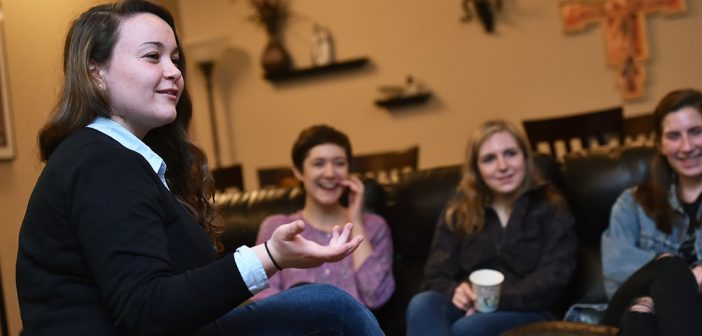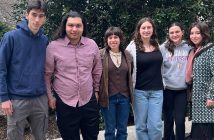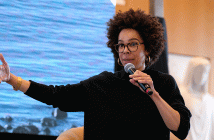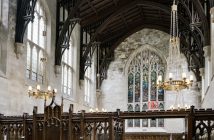On any given evening, however, small groups of students have chosen to press the pause button on all that hectic activity to spend some time in peaceful reflection, prayer, and community building.
These student-led groups, called Christian Life Communities (CLCs), are rooted in Ignatian spirituality, and they offer ways to help students connect their faith to their daily lives.
“A big part of Ignatian spirituality is finding God in everyday life,” said Mary Catherine Redmond, PBVM, the pastoral minister for CLCs at the Rose Hill campus. By drawing upon the Spiritual Exercises of St. Ignatius Loyola, CLCs can help students reflect upon their own identities and life decisions, she said.
A bedrock for spirituality
For Matthew Leone, a Fordham College at Lincoln Center senior, being involved with CLCs since he was a freshman has provided him with “a new bedrock” for his spirituality.
“It’s been kind of my life and blood for the last four years,” he said. “It’s a good place in your week to stop, reflect, relax, and find deeper meaning in things.”
CLCs at Fordham are part of a larger international movement, which began as a post-Vatican II initiative in the early 1970s. Their history goes back even further, however, beginning as the Sodality of Our Lady, founded in Rome in 1563 by a young Jesuit named John Leunis, S.J.
According to Erin Hoffman, associate director of Campus Ministry and the coordinator of CLCs at the Lincoln Center campus, the groups are “the closest thing we have to a kind of lay Ignatian community.”
Fordham College at Rose Hill senior Vanessa Rotondo was drawn to join a CLC as a sophomore because it provided an opportunity for deep spiritual inquiry in an environment of safety and acceptance.
“I’m someone who likes to engage in theological and philosophical thoughts and questions, but I always preferred to have them internally. Realizing that other people were doing the same thing, there really was a strong comfort and validation,” she said.
There are currently two undergraduate CLC groups at Lincoln Center and 10 groups at Rose Hill, including one for commuters and one for graduate students. Each CLC group of about six to 10 members meets for at least an hour once a week.
Pray, focus, mediate
All CLC sessions start with an opening prayer followed by check-ins with group members. The bulk of the meeting is then devoted to a focus exercise tailored to the needs and interests of each group. This could be a meditation based on the Ignatian Exercises, or a reflection on a song, poem, or scripture, said Hoffman.
CLCs began at Fordham in 2006, based on the three pillars of faith, community, and mission. Though they are firmly Christian in tradition, they are open to people of all faiths or levels of faith.
“It’s all rooted in our personal experience,” said Hoffman, “so everybody is an expert in their own experience. Inviting people to share from where they are enables us to welcome people who have been doing this for a long time or people who are just getting started.”
This approach of inclusivity and acceptance has nurtured loyal student CLC members.
“What I’ve noticed over the years is the sense of community that you build,” said Leone. “You really do develop a sense of trust and camaraderie.”
Rotondo has had a similar experience.
“There are definitely friendships that have emerged solely because we’ve agreed to bear our faith in this community,” she said.
–Nina Heidig
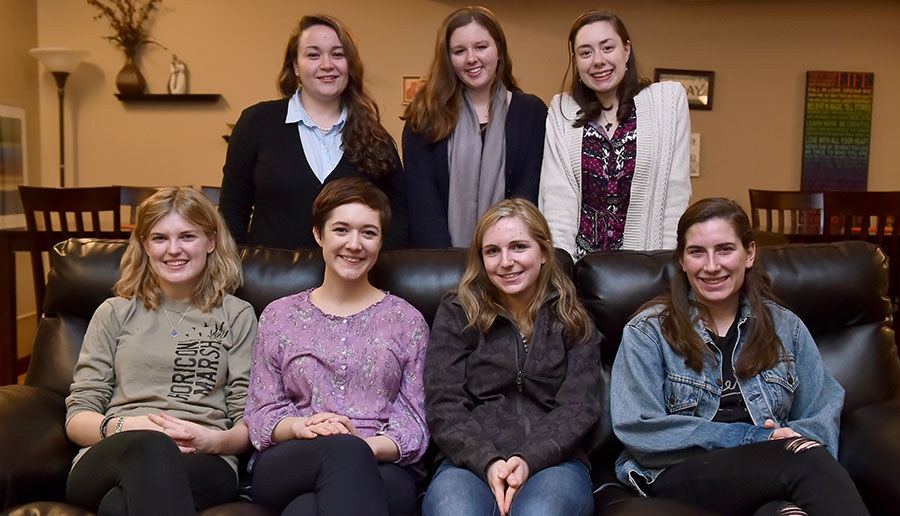
CLC members, seated: seniors Nicole Kegley and Amy Endres; freshman Olivia Killilea; and senior Juliette Strasser. Standing: seniors Vanessa Rotondo, Mariah Hosie, and Molly Crawford. (Photo by Dana Maxson)
